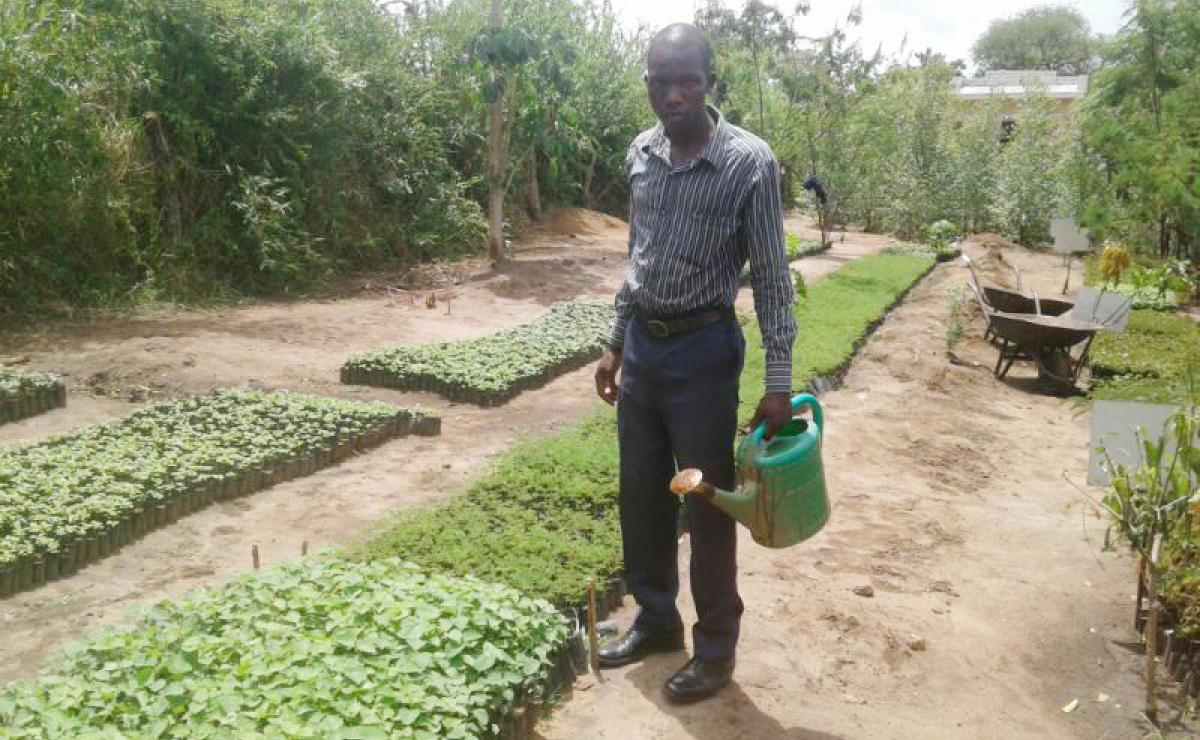Obita: The gambler who ventured in tree planting

Raised in a poor family, Brian Obita dropped out of school after his father’s death in 2014. The oldest of the children, then 22-year-old Obita was now the family’s sole breadwinner. To fend for his family, Obita ventured in fish farming along other casual jobs like house painting. ‘‘I was desperate and willing to engage in any kind of job and as many as I could to put food on my siblings’ table,’’ Obita says.
However, the money from fish farming and house painting was not enough to enroll his six siblings back in school, as it was barely enough for food. Then, a drought in Tecwa village, Kitgum district dried up all the fish ponds.
‘‘We were hit by a long dry spell that dried up the water in my fish pond. Animals also encroached on my pond for water and drunk the little that was left,’’ Within three months, Obita explains that the aquaculture business he had inherited from his father was in ashes.
Worried about where and how to get his family’s daily bread, depressed Obita resorted to gambling and alcohol abuse. ‘‘I gambled my last pennies away in hope of getting more and whenever I lost the gamble, I drunk myself to sleep,’’ he adds.
From gambling to the tree nursery business
While at an environment sensitization campaign by Lutheran World Federation (LWF) in Amida sub-county, Obita developed an interest in tree nursery operations.
“They informed us about the returns on tree planting for a living and for environmental conservation. I liked the idea of both. I needed to start earning again and also wanted to do something about improving the climate and environment to avoid dry spells that had shattered my pond,’’ he says.
Passionate about learning about tree planting, Obita registered for training with Lilian Apio, an LWF Field Extension Worker at the Central Tree Nursery in Lamwo district in 2015. Under the European Union funded Teko Wa project, Obita received 120,000 shillings from LWF to cover his accommodation during the six-day training. He saved 60,000 shillings and then invested this in the tree nursery business.
The Teko Wa project aims at environment conservation, energy security and improving livelihoods. After the training, each participant receives a start-up kit, comprising a wheel barrow, slasher, soil sieves, 100kg of assorted seeds, two watering cans, and 30kg of potting. LWF also supports the tree farmers in creating markets for their products by creating linkages between them and other groups in the forestry sector like the National Tree Seed Centre.
“I was fascinated when I found a nursey bed with 7,000 Tectona grandis seedlings at Obita’s home,’’ Odongo Alex, the LWF Project Officer for Teko Wa project. No other training participant had yet taken the initiative to start planning seedlings or develop a nursery, as they had not yet received start up kits from LWF. Yet Obita had ventured into the business with his own savings.
Obita yields big profits from the tree nursery
From the tree nursery business, Obita earns a monthly average of 800,000 shillings (approx. 200 USD). With the income, he can pay school fees for his siblings and provides for his family’s needs. Obita has also saved up to 9,000,000 shillings from tree farming, expanded his nursery site from 100m2 to 400m2, planted a hectare of eucalyptus, and bought two plots of land in Kitgum Municipality, each worth 4,000,000 shillings. With the profits, he has also ventured into livestock farming and piggery and owns two oxen and four pigs. “I earned handsomely from the nursery, and that’s why I want to expand it even more and have the biggest in northern Uganda by 2018,’’ he adds.
“God created mankind and unlimited resources for wealth creation on Earth. The youth should explore these resources and transform them in to wealth,” Obita advises his fellow youth.
#EnvironmentProtectionFromDay1.

